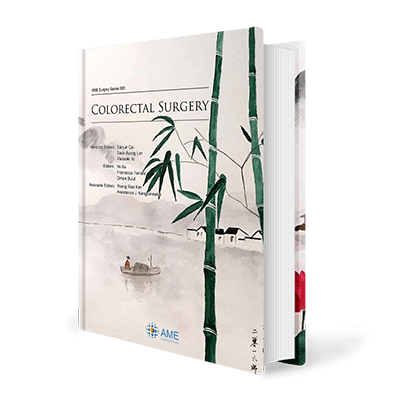45 Indocyanine green uorescence angiography during laparoscopic rectal surgery
Masaaki Ito, Hiro Hasegawa, Yuichiro Tsukada
49 Contrast-enhanced CT colonography for colorectal cancer localization in laparoscopic surgery
Nicola Flor
51 New competency assessment tool for laparoscopic colorectal surgery
Karin M. Hardiman
54 Single-port laparoscopic surgery for colorectal cancer: how can we move forward?
Orhan Bulut
57 Single port laparoscopic colorectal surgery: what did we learn from the ECSPECT prospective multicenter registry study?
John H. Marks Kei Nagatomo
60 Comparison between laparoscopic and open surgery in stage II and III colorectal cancer using propensity score matching
Mai Tsutsui, Seiichiro Yamamoto
63 Is previous abdominal surgery still a contraindication for laparoscopic surgery in colorectal cancer patients?
Anastasios J. Karayiannakis
66 Transversus abdominis plane block in laparoscopic colorectal surgery
Shunichiro Komatsu, Yoshihiro Fujiwara
68 Post-operative outcomes in robotic and laparoscopic colorectal surgery
Francesco Ferrara
71 Laparoscopic vs. robotic colorectal resections: new insights from the American College of Surgeons National Surgical Quality Improvement Program
Emilio Bertani
73 Improving preoperative endoscopic localization of colon and rectal tumours
Joshua A. Greenberg, Robin P. Boushey
75 Colorectal endoscopic submucosal dissection (ESD) could reduce the need for surgery of colonic polyps in the West
Yutaka Saito, Amit Bhatt, Takeshi Nakajima, Taku Sakamoto, John Vargo, Masayoshi Yamada, Masau Sekiguchi, Hiroyuki Takamaru, Seiichiro Abe, Yukihiro Nakanishi, Takahisa Matsuda
79 Is lymph node metastasis the only concern in high-risk submucosal colorectal cancer following endoscopic resection?
Chan Hyuk Park, Hyuk Lee
82 Commentary on transanal minimally invasive surgery for rectal lesions
Nikoletta Dimitriou, John Griniatsos
85 Transanal minimally invasive surgery (TAMIS): validating short and long-term bene ts for excision of benign and early stage rectal cancers
Anthony P. D’Andrea, Erin Duggan, Patricia Sylla
90 Transanal approach for rectal tumors: recent updates and future perspectives
Jeonghee Han, Nam Kyu Kim
101 Transanal minimally invasive surgery is becoming more commonly used for rectal lesions
Byoung Chul Lee, Seok-Byung Lim
104 Modular approach for single docking robotic colorectal surgery
Jamil Ahmed, Sofoklis Panteleimonitis, Amjad Parvaiz
Treatment of Colorectal Metastases
106 Surgical treatment of colorectal liver metastases
Amanda B. Cooper, Steven A. Curley
115 Multidisciplinary approach and targeted agents increase resectability of liver-limited metastases from colorectal cancer
Agostino Ponzetti, Francesco Pinta, Rosella Spadi, Patrizia Racca
119 Hepatic resection, hepatic arterial infusion pump therapy, and genetic biomarkers in the management of hepatic metastases from colorectal cancer
John C. McAuliffe, Motaz Qadan, Michael I. D’Angelica
129 Laparoscopic liver resections in two stages for the treatment of colorectal metastases: a review
Gabriele Spoletini, Salvatore Barbaro, Martina Fontana, Mohammed Abu Hilal
134 Are the clinical risk scores of survival after colorectal liver metastases still valuable in the era of laparoscopic liver surgery?
Brice Gayet, David Fuks
136 Comparison of laparoscopic versus open liver resection for colorectal liver metastases using propensity score matching
Toru Beppu, Katsunori Imai, Yasuo Sakamoto, Yuji Miyamoto, Hideo Baba
139 Abdominal metastases from colorectal cancer: intraperitoneal therapy
Hamza Guend, Sunil Patel, Garrett M. Nash
Adjuvant Radiochemotherapy of Colorectal Cancer
145 Neoadjuvant chemoradiation therapy for rectal cancer: current status and perspectives for the surgeon
Sérgio Eduardo Alonso Araújo, Guilherme Pagin São Julião, Angelita Habr-Gama, Bruna Borba Vailati, Rodrigo Oliva Perez
154 Hyperthermic intraperitoneal chemotherapic perfusion in colorectal cancer
Pedro Bretcha-Boix, Jose Farre-Alegre
Treatment of Postoperative Complications After Rectal Cancer Surgery
169 The in uence of anastomotic leakage on patients’ outcomes after rectal cancer surgery
Young Wan Kim, Bo Ra Kim
171 Implication of the low anterior resection syndrome (LARS) score for bowel dysfunction after rectal cancer surgery with symptomatic anastomotic leakage
Oliver Thomusch



